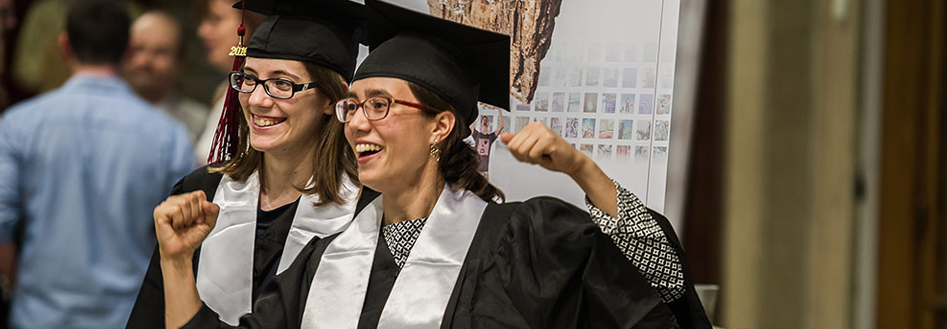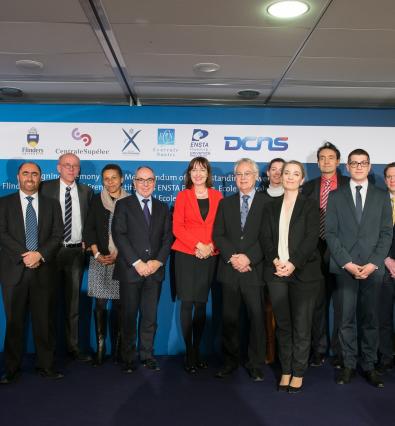The school at the heart of Université Paris-Saclay
CentraleSupélec participates in six LabEx (Laboratories of Excellence), two EquipEx (Equipment of Excellence) and one IRT (Institute for Technological Research) as part of the Université Paris-Saclay.
CentraleSupélec is a leading actor in the Paris-Saclay IdEx, labeled an “excellence initiative”. The aim of this IdEx is to roll out the activities of Université Paris-Saclay.
These successes position CentraleSupélec in relation to major societal issues: energy, digital society, health, nanosciences, environment and risks.
Within IdEx, CentraleSupélec works in synergy particularly with Paris-Sud University and ENS Cachan. The development of these successful projects demonstrates strong ties with our partners and our capacity to develop a prestigious university. Université Paris-Saclay aims to be one of the top 10 hubs for teaching and research worldwide.
The Université Paris-Saclay Doctoral College brings together 20 specialized doctoral schools associated with research laboratories. CentraleSupélec works with five Université Paris-Saclay doctoral schools.

(crédit: Université Paris-Saclay).
The objective of this doctoral college is to organize the doctoral policy and coordinate and pool certain activities within and across doctoral schools. It guarantees the quality of high-level scientific training and international scientific visibility. CentraleSupélec collaborates with five of the Université Paris-Saclay doctoral schools:
- École Doctorale de Mathématiques Hadamard (EDMH) [Doctoral School of Hadamard Mathematics]
- École Doctorale EOBE [Doctoral School of Electrical, Optical, Biophysics and Engineering]
- École Doctorale INTERFACES [Doctoral School of Interdisciplinary Approaches: Foundations, Applications and Innovations]
- École Doctorale SMEMAG (Sciences Mécaniques et Énergétiques, Matériaux et Géosciences [Doctoral School of Mechanical Sciences and Energy, Materials and Geosciences])
- École Doctorale STIC (Sciences et Technologies de l’Information et de la Communication [Doctoral School of Information and Communications Sciences and Technology])
Completing a doctorate with Université Bretagne Loire
Since the decree dated August 6, 2006, CentraleSupélec has been authorized to award the doctorate for students of the MATISSE Doctoral School within the Université Bretagne Loire doctoral college, as well as for the EMMA and IAEM doctoral schools of the Université de Lorraine.
Today, the CentraleSupélec doctoral degree is awarded to doctoral students registered in these three doctoral schools.
CentraleSupélec participates in the Institute for Technological Research (IRT) B-Com, in the fields of Networks, Multimedia and Healthcare.
Beginning January 1, 2017, Université Bretagne Loire will offer a joint doctoral training program developed as part of the Doctoral College initiative.
The Doctoral College unites 11 interregional doctoral, disciplinary or specialization schools, supported by six geographically independent doctoral colleges, to provide a direct link among doctoral students, research teams and institutions.
Université Bretagne Loire delivers the doctorate as part of its co-accreditation with member or associate institutions.
Doctoral student registrations will continue to be recorded in institutions that are authorized to award the doctorate.
CentraleSupélec is authorized to award the doctorate and is co-accredited for the MATISSE Doctoral School for the fields of Mathematics, Telecommunications, IT, Signal, Systems and Electronics, as well as for interfaces for these fields. CentraleSupélec will be co-accredited for the new MathSTIC Doctoral School beginning January 1, 2017
Completing a doctorate in the Lorraine region
Since the end of the 1980s, research in the Lorraine region has been organized according to disciplinary fields, uniting several higher education institutions and public research organizations.
CentraleSupélec participates in the Technical Research Institute (IRT) M2P in the fields of Materials, Metallurgy and Processes.
CentraleSupélec is authorized to award the doctoral degree for the following doctoral schools:
- EMMA in the fields of Mechanical Energy and Materials
- IAEM in the fields of IT, Automation, Electronics, Electrotechnical Engineering, and Mathematics












